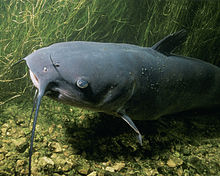|
List of fishes of Kansas
  There are roughly 135 recorded species of fish in the U.S. State of Kansas.[1] This list is an amalgamation of the works Cross & Collins books Handbook of Fishes of Kansas (1967) and Fishes in Kansas (1995) as well as Current Status of Native Fish Species in Kansas (2005) by multiple authors and the Pocket Guide of Kansas Stream Fishes by Jessica Mounts (2017). The following tags note species in each of those categories:
BackgroundKansas is located in the Great Plains region which is characterized by mostly slow-running rivers and a near total absence of large naturally occurring lakes excluding oxbows and a few shallow salt marshes and sloughs. Since the European settlement of the area, many rivers and creeks have been dammed creating large reservoirs, largely by the United States Army Corps of Engineers and the Bureau of Reclamation. The biggest of these reservoirs is Milford Lake at 15,709 acres (6,357 ha). Kansas is home to 12 rivers basins, all of which drain into the Gulf of Mexico approximately 507 miles (816 km) south. Order Petromyzontiformes (Lampreys)Family Petromyzontidae (Northern lampreys)
Order Acipenseriformes (Sturgeons & paddlefish) Family Acipenseridae (Sturgeons)
Family Polyodontidae (Paddlefish)
Order Lepisosteiformes (Gars) Family Lepisosteidae (Gars)
Order Hiodontiformes (Mooneyes)Family Hiodontidae (Mooneyes)
Order Anguilliformes (Eels) Family Anguillidae (Freshwater eels)
Order Clupeiformes (Herrings & relatives)Family Alosidae (Shads & sardines)
Order Cypriniformes (Carps, minnows, and relatives)  Family Catostomidae (Suckers)
Family Cyprinidae (cyprinids) 
Family Leuciscidae (True minnows)    
Order Siluriformes (Catfishes)Family Ictaluridae (North American freshwater catfishes) 
Order Esociformes (Pikes and mudminnows) Family Esocidae (Pikes)
Order Gadiformes (Cods)Family Lotidae (Lingcods)
Order Cyprinodontiformes (Toothcarps) Family Fundulidae (Topminnows & Killifish)
Family Poeciliidae (Livebearers)
Family Atherinidae (Silversides)
Order Scorpaeniformes (Sculpins)Family Cottidae (Sculpins)
Order Perciformes (Perch-liked fish)Family Moronidae (Temperate basses)
Family Centrarchidae (Sunfishes)  
Family Percidae (Perches)  
Family Sciaenidae (Drums)
References
|